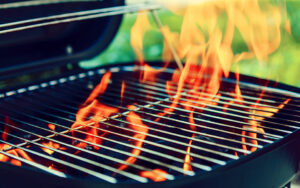
Grill safety tips to have a safe and delicious experience when firing up this summer
 Roughly seven in 10 American households have at least one grill (or outdoor, open-flame cooking device). And every year, more than 10,000 grill fires injured some 7,000 Americans while using backyard barbecue grills, with most incidents peaking in July — usually a case of good products used incorrectly.
Roughly seven in 10 American households have at least one grill (or outdoor, open-flame cooking device). And every year, more than 10,000 grill fires injured some 7,000 Americans while using backyard barbecue grills, with most incidents peaking in July — usually a case of good products used incorrectly.
According to the National Fire Protection Association, from 2011–2015, U.S. fire departments responded to an average of 9,600 home fires involving grills, hibachis or barbecues per year. That number included an average of 4,100 structure fires and 5,500 outside or unclassified fires, resulting in $133 million in direct property damage.
In the interest of everyone having a safe and enjoyable outdoor grilling season, the Code Council would like to share some information on open-flame cooking devices.
Tips for safe summer barbecues
- Keep your grill at least 10 feet away from your house. Farther is even better. This includes portions attached to your house like carports, garages and porches. Grills should not be used underneath wooden overhangs either, as the fire could flare up into the structure above. This applies to both charcoal and gas grills.
- Clean your grill regularly. If you allow grease and fat to build up on your grill, they provide more fuel for a fire. Grease is a major source of flare ups.
- Check for gas leaks. You can make sure no gas is leaking from your gas grill by making a solution of half liquid dish soap and half water and rubbing it on the hoses and connections. Then, turn the gas on (with the grill lid open.) If the soap forms large bubbles, that’s a sign that the hoses have tiny holes or that the connections are not tight enough.
- Keep decorations away from your grill. Decorations like hanging baskets, pillows and umbrellas look pretty and provide fuel for a fire. To make matters worse, today’s decor is mostly made of artificial fibers that burn fast and hot.
- Keep a spray bottle of water handy. That way, if you have a minor flare-up you can spray it with the water to instantly calm it. Water won’t harm your food, so dinner won’t be ruined.
- Keep a fire extinguisher within a few steps of your grill. And know how to properly use it. If you are unsure how to use the extinguisher, don’t waste time fiddling with it before calling 911. Firefighters say many fire deaths occur when people try to fight a fire themselves instead of calling for expert help and letting the fire department do its job.
- Do not turn on the gas while your grill lid is closed. Never do this. It causes gas to build up inside your grill, and when you do light it and open it, a fireball can explode in your face.
- Never leave a grill unattended. Fires double in size every minute. Plan ahead so that all of your other food prep chores are done and you can focus on grilling.
- Don’t overload your grill with food. This applies especially to fatty meats. If too much fat drips on the flames at once, it can cause a large flare-up that could light nearby things on fire.
- Never use a grill indoors. People often think it will be safe to use a grill, especially a small one, indoors. In addition to the fire hazard, grills release carbon monoxide — the deadly colorless, odorless gas — which needs to vent in fresh air or it can kill you, your family and pets.
Use caution firing up at apartment/condo complexes and highrises
With a gas or charcoal grill, an open flame with convection heat can easily cause a fire. Residents of apartments and condominiums who want to share in the summer fun of cooking outdoors with family and friends must take special precautions. According to the International Fire Code, you cannot have a grill on the deck unless the building and the deck are protected by a sprinkler system. (That rule is purely for a gas or charcoal grills. Electric grills are allowed on decks.)
The 2018 International Fire Code states the following:
308.1.4 Open-flame cooking devices. Charcoal burners and other open-flame cooking devices shall not be operated on combustible balconies or within 10 feet (3048 mm) of combustible construction.
Exceptions:
One- and two-family dwellings.
-
- Where buildings, balconies and decks are protected by an automatic sprinkler system.
- LP-gas cooking devices having LP-gas container with a water capacity not greater than 2 1/2 pounds [nominal 1 pound (0.454 kg) LP-gas capacity].





